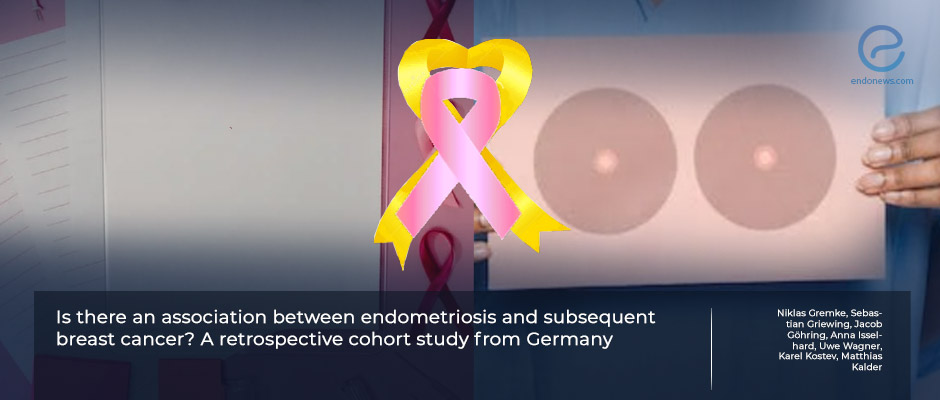Endometriosis and the risk of breast cancer
Jan 18, 2024
A large-scale German study proved no relationship between endometriosis and developing breast cancer.
Key Points
Importance:
- In the literature, there is no clear consensus about the relationship between endometriosis and the probability of breast cancerdevelopment.
Highlights:
- Endometriosis is not significantly associated with an increased risk of subsequent breast cancer.
What's done here:
- A German author team conducted a retrospective cohort study to investigate the association between breast cancer and endometriosis.
- The study group consisted of 15242 reproductive aged women diagnosed with endometriosis by 315 office-based gynecologists in Germany.
- A 1:1 matched control group (age, year, pre-defined co-diagnoses) was defined.
- The probability of coexistence of endometriosis and breast cancer within a 10-year interval was statistically examined.
Key Results:
- The mean age of the women in the study was 35.7, more than 90% were under 50.
- All women visited their gynecologists 3.2 times a year during the follow-up period.
- After ten years of follow-up, breast cancer incidence was 2.4% in the non-endometriosis cohort and 2.5% in the endometriosis cohort.
- No significant association was found between endometriosis and the risk of developing a subsequent breast cancer.
- A regression analysis revealed no significant association between endometriosis and subsequent breast cancer.
Strengths and limitations:
- Using large-scale study data, matching the properties to the control cohort, a ten-year follow-up period, yearly clinic follow-ups, and the clinically confirmed diagnosis of endometriosis are strengths.
- The data on lifestyle factors (smoking, alcohol, family history, parity, hormone replacement therapy, oral contraceptives, menopausal status) which might predispose to breast cancer, has not been studied.
Lay Summary
An increased risk of cancer with endometriosis has been in the attention field of endometriosis researchers since 1925, starting with Sampson. Several large meta-analyses supported the increased risk of clear cell and endometrioid ovarian cancer in women with deep infiltrating endometriosis. Breast cancer also attracted the attention of many authors, and a potential association was explored.
Endometriosis and breast cancer share many risk factors due to prolonged estrogen exposure to tissues from early menarche to late menopause. However, conflict results have been obtained in the literature on this subject.
Gremke et al. from the Deptartment of Gynecology and Obstetrics of Phillips University of Marburg, Germany, planned a large-scale retrospective cohort study to examine if there is a relationship between endometriosis and breast cancer. Original paper is recently published in Breast Cancer Research and Treatment.
The authors collected 15242 data on women diagnosed with endometriosis from 315 gynecologists' offices and created a non-endometriosis cohort in an equal number of women using greedy propensity score matching. The matching of the two groups based on age, index year, average yearly consultation frequency during follow-up, obesity, benign breast disorders, etc.
According to the results of 10 years of follow-up, no significant association between endometriosis and subsequent breast cancer was observed in regression analyses. For the previous studies that reached opposite conclusions, the authors drew attention to the influence of infertility factors and the use of oral contraceptives in patients with endometriosis.
" Although endometriosis is not associated with increased risk of breast cancer, gynecologists should continue to perform regular breast examinations in their clinic routine." concluded the authors.
Research Source: https://pubmed.ncbi.nlm.nih.gov/38141056/
clinic follow-up breast diseases breast cancer obesity regression analyses endometriosis.

